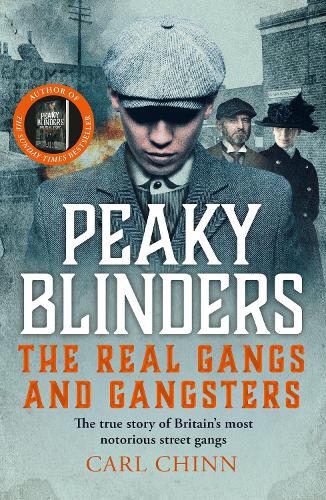
Peaky Blinders - The Real Gangs and Gangsters: The true story of Britain's most notorious street gangs
(Paperback)
Publishing Details
Peaky Blinders - The Real Gangs and Gangsters: The true story of Britain's most notorious street gangs
By (Author) Carl Chinn
John Blake Publishing Ltd
John Blake Publishing Ltd
2nd December 2025
28th August 2025
United Kingdom
Classifications
General
Non Fiction
Violence and abuse in society
Television
364.106609424909034
Physical Properties
Paperback
368
Width 129mm, Height 198mm
Description
You know who the Peaky Blinders are ... It's time to see where they began.
At the turn of the twentieth century, Birmingham was seemingly transforming into a wealthy, bustling metropolis, celebrated for its manufacturing and local government. Yet behind this optimistic facade, the poorest and most vulnerable in society were abandoned. This longstanding inequality aroused unrest, sparking violence and terror from backstreet gangsters who'd become known as peaky blinders.
In this fourth instalment of the bestselling series, historian Carl Chinn draws upon his decades of expertise and his own family history to reveal even more about these notorious gangs, going back to where it all began. Chinn exposes the real people whose bloody feuds, murders and maiming, baiting of police officers, bullying of the decent poor, gendered violence, blackmailing, and disturbing roles in political riots and racist attacks made Birmingham infamous as the city of the Peaky Blinders.
Peaky Blinders: The Real Gangs and Gangsters is a vivid and shocking portrait of Birmingham through the Victorian and Edwardian eras, unpicking the storied history of its vicious gangs to reveal how they forced themselves into notoriety.
Author Bio
Professor Carl Chinn MBE Ph.D. is a social historian with a national profile, writer, public speaker, and teacher. An off-course bookmaker himself until 1984, he is the son and grandson of illegal bookmakers in Sparkbrook, and the great-grandson of a peaky blinder, whilst his mother's family were factory workers in Aston. His writings are deeply affected by his family's working-class background and life in the back-to-backs of Birmingham and he believes passionately that history must be democratised because each and every person has made their mark upon history and has a story to tell.
